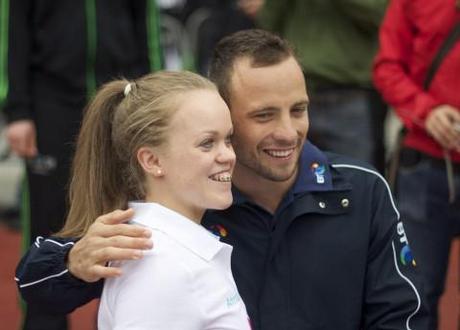 Paralympians Ellie Simmonds and Oscar Pistorius. Photo Credit: Flickr
Paralympians Ellie Simmonds and Oscar Pistorius. Photo Credit: Flickr
The background
The London 2012 Paralympic Games promised to be the best yet and have thus far delivered.
In fact The Independent reported that London 2012 is officially the best Paralympics ever: “It’s easy to dismiss the suggestion that these are the most successful Paralympics ever as patriotic bluster, but Locog has the figures to prove it. Not only have the 2.7 million tickets sold beaten Beijing by 900,000, but the revenue generated has reached £45m, some £10m more than the expected total.”
We look at some of the standout moments of the games, and what their legacy will be for the future of Paralympic sport and disability awareness.
Team GB
As of Friday morning, Team GB ranked second in the medals table with 32 golds, already surpassing their medal haul from Beijing and, crucially, the 103-medal target set by funding body UK Sport. This has ensured that funding will continue for these paralympians long past Rio 2016. The games have been full of inspiring moments from Team GB: Helen Lucas became the first British Paralympian to win gold in sailing, ‘Hurricane’ Hannah Cockroft broke two world records on her way to winning gold in the 100m T34 weelchair race, Jonnie Peacock beat hot favorite and Paralympic legend Oscar Pistorius to win gold in the 100m, swimmer Ellie Simmonds took two golds and a bronze in the pool, and cyclist Sarah Storey won her 11th Paralympic gold medal, making her, according to Brenden Gallagher of The Telegraph, “Britain’s greatest Paralympics all-rounder.”
Speaking to The Guardian after her 200m medley win, 17-year-old Paralympic swimmer Ellie Simmonds said: “Apparently 3.3 million people watched my race which is amazing not just for me but for getting the Paralympics out there. Hopefully people out there will get inspired by us and get into sport.”
Inspiring – and cringe-worthy – moments
The 2012 games have had their fair share of standout moments. Chinese triple jumper Li Duan sensationally whipped off his trousers before jumping, to the delights of the cheering crowd. GB Paralympic table tennis player David Wetherill became an internet sensation after a video of his jaw-dropping shot scored from a full stretch dive got 2 million hits in a matter of days. Another popular video was of a less inspiring Paralympic moment: GB cyclist Jody Cundy’s foul mouthed rant after his shock disqualification from the C4-C5 1km time trial. Cundy wasn’t the only enraged athlete – Paralympic poster boy Oscar Pistorius’s shock defeat at the hands (or blades) of Brazilian Alan Oliviera caused him to accuse the IPC of an unfair classification system. The Telegraph’s Paul Hayward commented on Pistorius: “Pioneer for the truth or sore loser? Either way, Paralympic running is exposing weaknesses and ambiguities it will have to sort out if the wider public is to embrace it as a fair contest.”
What next?
Prime Minister David Cameron declared Britain was a “trailblazer” in Paralympic sports, but BBC News reported that continuing the legacy of the games is largely up to individual clubs, mostly run by charities and volunteers: “Club managers say changing disabled people’s attitudes and communicating about what is on offer are challenges as big as trying to secure funding.” The statistics show that, in London, “just over 20% of disabled people participate in sport once a week, compared with 36% of non-disabled people, according to government agency Sport England.” Yet BBC News also reported that an annual festival of disability sport is to be staged at the Olympic Park as part of a £2 million package of future Paralympic plans at the east London venue and Channel 4 noted that TFL are planning to retain all ‘temporary’ ramps added to the tube for the games and add more to other stations with limited access to make the capital more accessible for disabled travellers.
‘Virtual apartheid’?
However, The Evening Standard’s Ian Birrell remains sceptical of the Paralympic legacy and accused the government of gross hypocrisy regarding the disabled: “[F]or all the talk of blazing British trails, for all the platitudes and praise, disabled people are living in virtual apartheid. Facilities are woeful and worsening, jobs few and far between, transport often inaccessible. Most disabled people are not striving for gold, just the humdrum normality of life as lived by the rest of us.”
More on the London 2012 Paralympic Games
- David Wetherwill’s amazing shot
- Top four shocks of the Paralympics so far
- London 2012 Paralympics keeps Olympic flame alive
- Paralympics classification causes confusion, controversy

